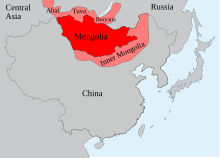Pan-Mongolism
The Pan-mongolism or Mongolian nationalism is the ideology , all Mongolian peoples to unite and establish a large-Mongolian government. The movement includes Tuvins , Kazakhs, and a few other Siberian peoples believed to have Mongol ancestry.
history
The origin of this idea goes back to Genghis Khan , who once united all Mongols. During the Second World War , the idea got a new boom and was supported by the Japanese Empire . During this time, many Mongolian paramilitary groups tried to expel all non-Mongols and planned to march into central China with the help of the Japanese army .
After the defeat of Japan, communists took power in Mongolia and the idea of Greater Mongolia faded into the background. After the fall of communism, Pan-Mongolism gained strength and is now a partly central part of Mongolian politics. Mongolia is one of the most nationalistic nations in the world today. China made a pact with Mongolia to respect the territorial borders. To this end, China will strengthen and promote the rights of the Mongols in Inner Mongolia.
Pan-Mongolian parties
The Tsagaan Chas Party , the Mongolian People's Party , the Democratic Party (including the National Democratic Party), as well as several other groups in Mongolia and a variety of groups in China, Russia, Korea and Kazakhstan support or have Pan-Mongolism in theirs Party platform.
Individual evidence
-
↑ Kaplonski, Christopher: Truth, History, and Politics in Mongolia . Psychology Press, 2004, p. 15,
Black, Cyril; Dupree, Louis; Endicott-West, Elizabeth; Naby, Eden (1991). The Modernization of Inner Asia . ME Sharpe, p. 193. - ↑ Esherick, Joseph; Kayalı, Hasan; Van Young, Eric (2006). Empire to Nation: Historical Perspectives on the Making of the Modern World . Rowman & Littlefield. pp. 246, 249-251.
-
^ Sanders, Alan (2010). Historical Dictionary of Mongolia . Scarecrow Press, pp. 153-155,
Hodder, Dick; Lloyd, Sarah; McLachlan, Keith (1998). Land-locked States of Africa and Asia . 2 . Taylor & Francis. p. 150. - ↑ Rossabi, Morris (2005). "Sino-Mongolian Relations". Modern Mongolia: From Khans to Commissars to Capitalists . University of California Press, pp. 226-228, 232, 242.

